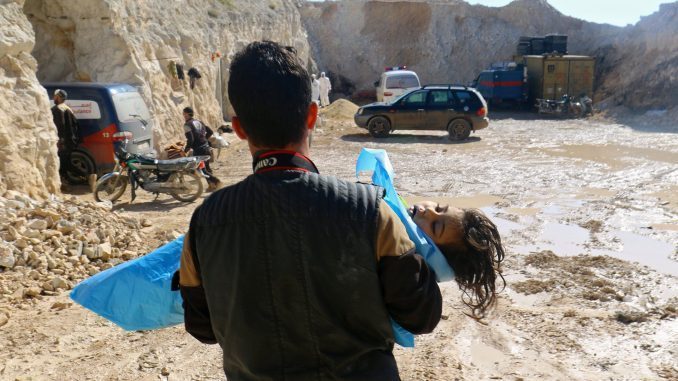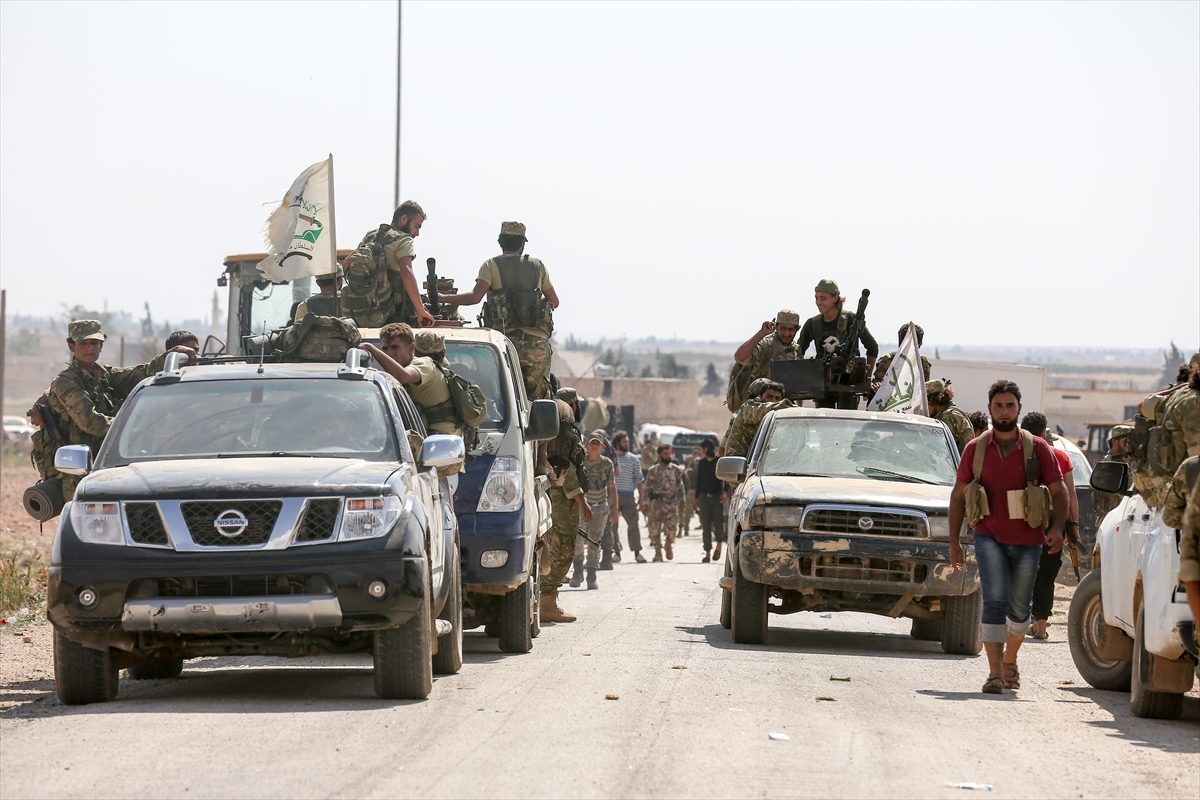
The US stance towards the crisis in Syria has been unclear in Obama’s era and developed to be messier after Trump’s took power.
It was featured by contradicting statements, change in policies, putting more restrictions regarding refugees issue, and surprising military attacks finally.
However, there are still ways that Trump can help ease the crisis and even end it other than military and verbally shows.
Trump has made it clear before his inauguration that he has no desire to confront Russian President Vladimir Putin in Syria, and he has said America would have been in much better shape if it had done nothing to help Syria’s opposition.
Trump said in one presidential debate: “I don’t like Assad at all, but Assad is killing ISIS. Russia is killing ISIS and Iran is killing ISIS,” indicating that he would worry less about consistent American relationships in the Middle East and more about defeating ISIS and getting the US out of the region.
He stated in the second presidential debate that regime change only causes more instability in the Middle East and while Assad is not exactly a welcome partner, shoring up his government is the best way to stem the extremism that has flourished in the chaos of Syria’s civil war.
After he was elected and took his place in the white house, one of the first executive order he signed was a ban to limit immigration and refugees from some Muslim-majority countries, fulfilling a campaign-trail promise to introduce what he dubbed “extreme vetting.”
The order banned Syrian refugees, claiming they are “detrimental” to the interests of the United States, putting more pressure in the suffering civilians, who many of them lost the last hope in medical treatment or better life after this order.
Read more: How Trump’s travel ban is killing the Syrian refugees
A new policy for Syria, or not?
In a surprising act, the U.S. ambassador to the United Nations said that the United States’ diplomatic policy on Syria, for now, is no longer focused on making Bashar al-Assad leave power, in a departure from the Obama administration’s initial and public stance on Assad’s fate.
“You pick and choose your battles and when we’re looking at this, it’s about changing up priorities and our priority is no longer to sit there and focus on getting Assad out,” U.S. Ambassador Nikki Haley told a small group of reporters.
“We can’t necessarily focus on Assad the way the previous administration maybe did. Do we think he’s a hindrance? Yes,” she said.
“Are we going to sit there and focus on getting him out? No.”
White House spokesman Sean Spicer said that regarding Assad, “there is a political reality that we have to accept in terms of where we are right now.”
“We had an opportunity and we need to focus now on defeating ISIS,” Spicer said. “The United States has profound priorities in Syria and Iraq and we’ve made it clear that counterterrorism, particularly the defeat of ISIS, is foremost among those priorities.”
A few days later more than 60 civilians were killed in a new chemical attack carried out by Assad regime’s air force on the rebel-held Idlib province, taking advantage of the US latest remarks.
However, the US responded to this attack by a missile strike that targeted a military airbase belonging to Assad regime in Syria.
Two U.S. warships fired dozens of cruise missiles from the eastern Mediterranean Sea at the airbase controlled by Assad regime forces in response to the deadly poison gas attack in a rebel-held area on Tuesday, U.S. officials said.
“Tonight I ordered a targeted military strike on the airfield in Syria from where the chemical attack was launched,” Trump said.
Fifty-nine Tomahawk missiles were launched from the USS Porter and USS Ross around 8:40 p.m. EDT, striking multiple targets – including the airstrip, aircraft and fuel stations – on the Shayrat Air Base, which the Pentagon says was used to store chemical weapons.
Anyway, this move didn’t resemble any change in the US new policy towards Syria but was a warming for Assad regime to not use “prohibited weapons again” and a show of power by the US.
The U.S. cruise missile attack was a “one-off,” a U.S. defense official told Reuters, meaning it was expected to be a single strike with no current plans for escalation.
In the light of this “confused and confusing” policy the humanitarian crisis in Syria continue to deteriorate as no real moves are being taken to solve the crisis.
However, experts at some of the world’s largest humanitarian aid groups outlined three actions the White House could take to ease the humanitarian crisis in Syria, and make a starting point to build trust for the political process.
1. End the refugee ban
One week after taking office, Trump enacted a travel ban that stopped refugees from entering the US and prohibited people from seven predominantly Muslim countries, including Syria, from entering the US.
The order has been blocked by federal courts, but a revised version of the ban was set to go into effect last month, before courts temporarily blocked it from being implemented. That program also put a temporary halt on the US refugee resettlement program.
“If the refugee moratorium is lifted, and the original refugee acceptance numbers are re-established, then the most vulnerable Syrian refugees will have a home outside of Syria to come to and that includes many children who can often bear the brunt of the violence inside Syria,” said Sunjeev Bery, advocacy director for Middle East-North Africa issues at Amnesty International USA.
Policy experts at Amnesty International USA, the International Rescue Committee and Care agreed that the travel bans blocked an important route to safety for Syrians.
“Hopefully there’s a recognition now of the real horrors in Syria and what’s driven five million people outside the borders and into the frontline states around it and why they are refugees, why they are fleeing violence and suffering,” said Amanda Catanzano, senior director of international programs of policy and advocacy at the International Rescue Committee.
By not accepting refugees, she said, the US is failing to show solidarity with its allies, including Jordan and Turkey, who are accepting large numbers of refugees.
These sick Syrian refugee children had been cleared to come to the U.S. Then they were forced to cancel their trip. pic.twitter.com/ggU1NwOqDp
— AJ+ (@ajplus) March 16, 2017
2. Push for accountability
More broadly, advocacy groups agreed the US needs to push for those responsible for chemical attacks and other violations of international law in Syria to be held accountable.
“We condemn in the strongest possible terms attacks on civilians, and that has unfortunately been all too common an occurrence in the Syrian conflict and we think it’s important for the international community to hold parties accountable or we will see a further decline in respect for international human rights law and human rights standards,” said David Ray, vice president of advocacy at Care.
The UN general assembly established such a method in December 2016 with a resolution that creates a mechanism for investigating and holding accountable those who have violated international human rights law in Syria since 2011.
“A solid first step would be to both materially and rhetorically support that mechanism,” said Catanzano of the International Rescue Committee.
She said that should be accompanied by a call for an immediate and impartial investigation into the chemical attack this week.
Civilian areas in Khan Shaykhun were targeted with poisonous gases this morning. Initial rprts of 50 killed incl wmn & chldrn, 300+ injured. pic.twitter.com/ZQ6MAgsqNO
— The White Helmets (@SyriaCivilDef) April 4, 2017
3. Reconsider White House budget proposal for foreign aid
Advocacy groups also expressed concern about the White House’s budget proposal, which includes deep cuts to US diplomacy and foreign aid. The US has given $5.9bn to Syria since 2011.
“The need continue to grow and certainly it is not the time to back down from our leadership role, certainly in terms of the kinds of budget proposals the administration has put forward,” said Care’s Ray.
He said it was important for the US to not retrench from its contributions to international aid because of the humanitarian crises in Syria, as well as those unfolding in sub-Saharan Africa and Yemen.
Catanzano said humanitarian assistance makes it possible for families affected by the conflict to access food, water, sanitation, medical assistance, protection for women and girls and education.
“Massive cuts in foreign assistance are inconsistent with trying to address this suffering,” she said. “When taken together with a shutdown of the the resettlement program, it’s a signal that refugees aren’t welcome here and we won’t help them where they are”.
The Syrian crisis began as a peaceful demonstration against the injustice in Syria. Assad regime used to fire power and violence against the civilians and led to armed resistance. 450.000 Syrians lost their lives in the past five years according to UN estimates, and more than 12 million have lost their homes.



